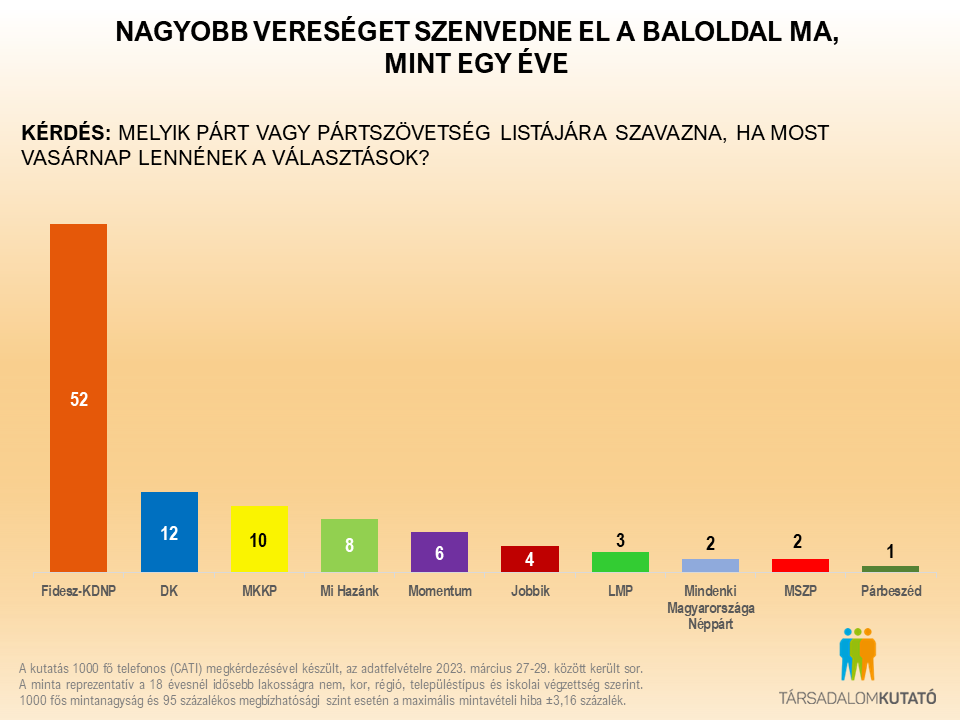According to a new survey conducted by the polling firm Társadalomkutató (Societal Research), Fidesz would win an election this coming Sunday with the same level of support (52 per cent) as they did a year ago, while the united opposition (which got 36 per cent at the time) would perform even worse. The Kétfarkú Kutyapárt (Two-Tailed Dog Party) would most likely pass the five-per-cent parliamentary threshold with its ten per cent support, while the Mi Hazánk (Our Homeland) party’s measured eight per cent share is also an increase compared to last year’s vote.
Társadalomkutató was the pollster that provided the most accurate prediction for the April 2022 election.
On the first anniversary of that election, they conducted a new survey to gauge the political preferences of Hungarian adults. According to their findings, if an election were to be held this Sunday, 52 per cent of those who would cast their votes would support the Fidesz-KDNP alliance, which is remarkably close to the actual 2022 parliamentary election result of 52.5 per cent.
Based on these poll numbers, the governing parties could still count on every other voter a year after the latest landslide Fidesz victory, and thus would be capable to reproduce those results again.

Support for the leftist opposition party alliance has further declined. Before the last parliamentary elections, Társadalomkutató predicted a 40 per cent share of the popular vote for the leftist joint list, but they could only get 36 per cent of people to cast their ballots for them in the actual election. Now, the parties of the 2022 election alliance only have a collective 30 per cent support, according to the poll results. The left-wing camp has thus not only become more fragmented due to the ex-PM candidate in the 2022 elections Péter Márki-Zay’s movement set to become an independent party, and the former leader of Jobbik, Péter Jakab founding a new movement, but also has also shrunk in terms of voter support. The survey did not query respondents about Jakab’s organisation, as it is yet to be registered as a political party and therefore could not participate in an election.
The popularity of the parties of the shattered alliance shows a mixed picture. The strongest among them is the Democratic Coalition, backed by 12 per cent of voters. DK is followed by Momentum with half their support, at six per cent. Jobbik is next in line, hovering around the entry threshold with four per cent. LMP (three per cent), MSZP (two per cent), and Párbeszéd (one per cent) significantly lag behind the support necessary for parliamentary entry and the formation of a parliamentary group. The Mindenki Magyarországa Néppárt (Everybody’s Hungary People’s Party, which emerged after the 2022 elections, and is to be officially established in May, was measured at two per cent.
Those who no longer back the former left-wing alliance are likely to vote for other parties.
In 2022, only Társadalomkutató predicted that Mi Hazánk could enter the National Assembly. Since the election, the party has further improved its six per cent of the popular vote measured by the institute which was later realised at the actual ballot boxes: ‘this Sunday,’ eight per cent of voters would cast their votes for the radical right-wing party.
The survey was conducted by telephone (CATI) with 1,000 participants, and the data collection took place between 27–29 March. The sample is representative of the population aged 18 and over, divided by age, region, settlement type, and educational attainment. With a sample size of 1,000 and a 95 per cent reliability level, the margin of error is 3.16 per cent.








